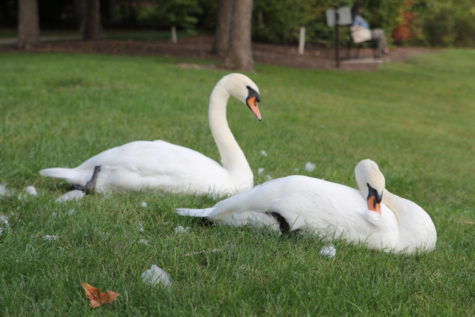Letter: Cases are on the rise, we are entering winter and we need a plan from ISU

Graduate student voices address their concerns for future semesters and urge administration and President Wendy Wintersteen to act on these concerns.
November 22, 2020
As Oct. 28, Nov. 5 and Nov. 11 communications from Cyclone Health and President Wendy Wintersteen were announced, there has been a recent increase in COVID-19 cases among the Iowa State community, and this does not even seem to include data from the randomized testing that we were informed would begin in an Oct. 9 email.
This rise in cases is happening at the same time as the nation is entering flu season, colder weather is beginning to force community members inside and many students are preparing to leave Ames and enter other communities for the duration of Winter Break.
Graduate students, since the summer, have been requesting increased safety measures, transparency and equitable protections from the university regarding its COVID-19 response. The university has made significant progress this semester in increasing testing capacity and has made efforts to communicate more effectively regarding the COVID-19 response, and we thank the university administration for these efforts.
We now urge the university to continue to show that they listen to the Iowa State community and to show that they really do prioritize the health, safety and education of all members of the Iowa State community. We urge Iowa State administration to take the following steps as soon as possible:
First, we ask the university administration to immediately scale up its COVID-19 testing protocols. Following the examples of the University of Michigan and the state of Utah, among others, we urge the administration to implement mandatory weekly testing for all those who live or work on campus. Along the same lines, as much as we appreciate the administration allowing for easier access to tests prior to Winter Break, we urge the administration to again follow the example set by its peers and institute mandatory testing before students who live on campus leave for the end of the semester.
We would also like to restress the importance of effective communication to the campus and Ames community regarding the progress of randomized testing procedures, and we ask the university to ensure that we are all provided results of this randomized testing before students prepare to return to communities outside of Ames for Winter Break and upcoming holidays. We were relieved after receiving Wintersteen’s Oct. 9 email detailing plans to initiate random testing to account for asymptomatic cases. However, we have yet to see any results from this testing.
Second, we urge the administration to release information immediately about the steps Iowa State is taking to ensure the university is not responsible for community spread outside of Ames when students leave for Winter Break.
We would like to thank Wintersteen for her Nov. 5 and Nov. 11 emails encouraging students to test before leaving for Winter Break and to follow recommended health guidelines. We would also like to thank the Department of Residence for providing students with the option of staying in Ames over break. However, it is still unclear whether there is enough testing capacity to allow all students leaving for break to be tested.
And while the administration acknowledges in the Nov. 5 email that “tests reflect only one point in time,” they do not seem to be recommending that students quarantine before visiting family or friends in other communities. Additionally, the university has been encouraging in-person interactions and has not been enforcing physical distancing for much of this semester, despite the continuing COVID-19 crisis in the state and the recommendations of public health officials.
Third, we encourage Iowa State administration to communicate to the Iowa State and Ames community, as soon as possible, what the university’s current plan is for students’ return at the beginning of the spring semester. This plan should detail how the university will prevent a repeat of August and September, when cases rose significantly upon students’ return, making national news and putting the health and safety of our community at risk. This plan should also detail how the university plans to combat the problems regarding accommodations and burnout that many members of the Iowa State community have faced this semester:
We ask the university to address the burnout that has been widespread among faculty and students due to the condensed semester with no breaks. The extended Winter Break will help relieve burnout (for those not taking or teaching classes over the winter session) from the fall semester. However, 15 straight weeks in the spring, with no break, will once again contribute to faculty, staff and student burnout, harming physical and mental health as well as educational and research progress. A condensed semester is currently the plan for the spring as well, and we ask the university to take steps to ensure this degree of burnout does not repeat. As one step in this direction, we urge Iowa State to follow the example of University of North Carolina and include several wellness days in lieu of spring break.
We urge the university to ensure all faculty, staff and students will be granted work and learning accommodations if requested and to ensure there will not be pressure from any department, supervisors or faculty regarding these requests. We know by now that, while COVID-19 is more of a risk to individuals with certain underlying conditions, it is a virus that can severely harm the health of anyone, even those who are young, healthy and without preexisting conditions.
Any individual who would like accommodations should not be required to show private medical documentation nor rely on individual supervisors to honor (or not) accommodation requests. This contributes to an inequitable environment, where the most vulnerable are required to reveal preexisting conditions and where those with the most power in a work or class situation will determine the health and safety of those with less power.
We know that for the fall, some individuals — depending on their department and their supervisor — were pressured into working and attending class in-person, even when they felt unsafe to do so. Recourse such as going to your college dean or the provost is not always an effective solution, especially if power dynamics are at play and subordinates are being pressured by supervisors.
We also urge Iowa State administration to put guidelines in place that will ensure students are not told to take another class if they ask for accommodations. Students have been told this in the fall and are already being told this as they register for spring classes.
Due to the uncertainty of the virus and the expected health situation in spring 2021, we strongly encourage the university to offer all courses that can be virtual as virtual. While recent news has informed us of encouraging progress regarding a vaccine, health officials warn us that even after a vaccine is available, we will have to abide by current safety recommendations for some time.
The goal should not be to offer as many in-person classes as possible when the health situation is expected to be just as serious in spring 2021. If the university truly values and prioritizes the health, safety and education of its students and community, the goal should be to provide the best education possible in the safest format possible; and in the current health situation, that format is online.
We have also seen that for many classes, a synchronous online format can simulate the traditional in-person experience well, and given the circumstances, it’s sometimes even better, with no need for masks or social distancing and with fewer absences because students can attend even if quarantining. This format also helps ensure professors focus their efforts on the educational experience of all students in their class, as opposed to prioritizing the in-person experience and unintentionally neglecting the most vulnerable students who may not be able to attend in-person.
To accommodate this situation, this decision should be announced as soon as possible, giving instructors time to adequately prepare spring classes for an online format and giving university leaders time to create a plan for prioritizing the mental and physical health of its community members during the spring semester.
Once again, we thank all members of the university community for your tireless efforts to offer quality education throughout this crisis. We now look to our administration for a continued response to this crisis that prioritizes health, safety, transparency and equity within this community.
Authors:
Caroliena Cabada, MFA candidate, creative writing and environment
Vivian M Cook, M.S. candidate, community development and sustainable agriculture
Dhruv Raturi, M.Engr. candidate, materials science and engineering
Kelsey Zimmerman, MFA candidate, creative writing and environment
Facebook group for graduate students: https://www.facebook.com/groups/isuemployeevoices















